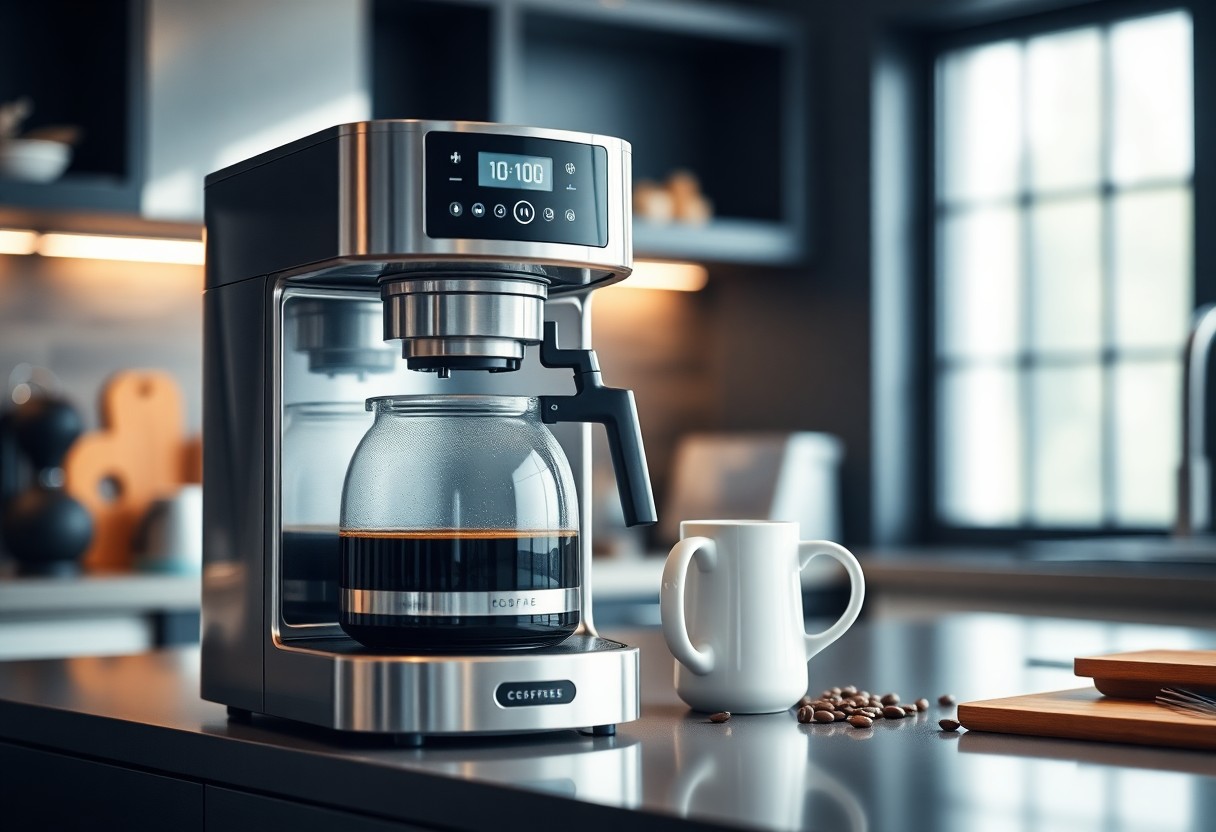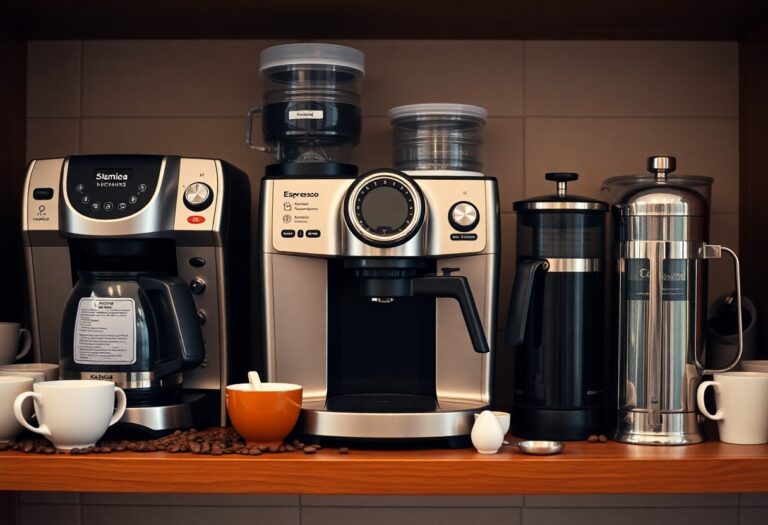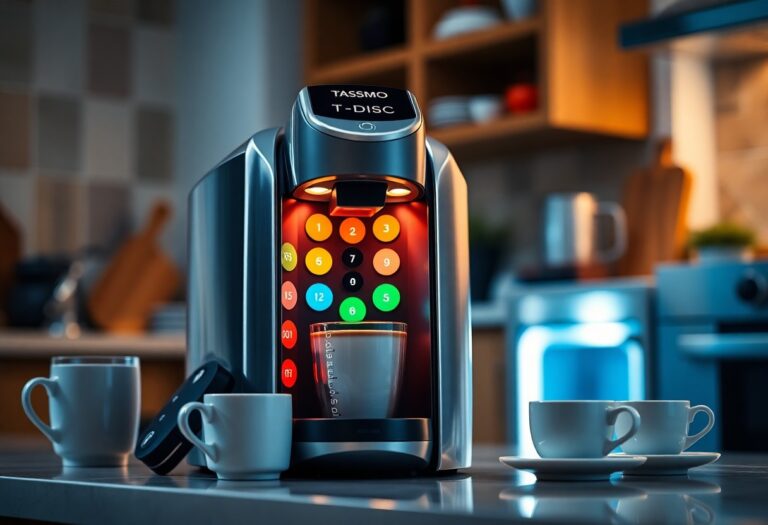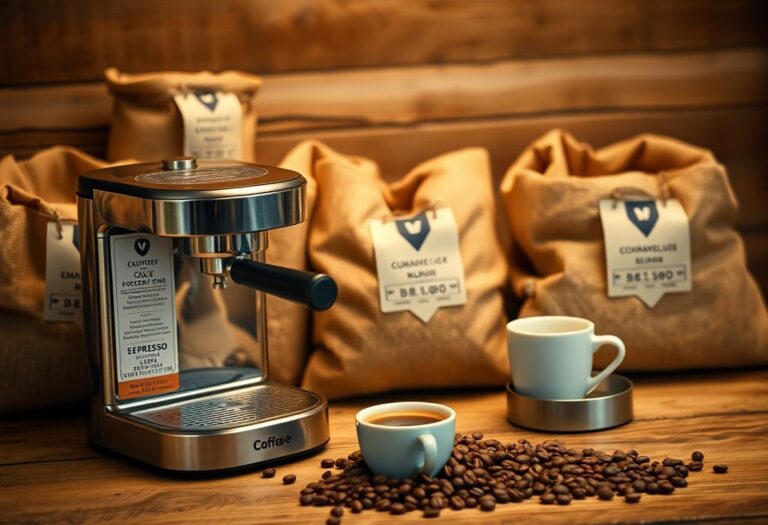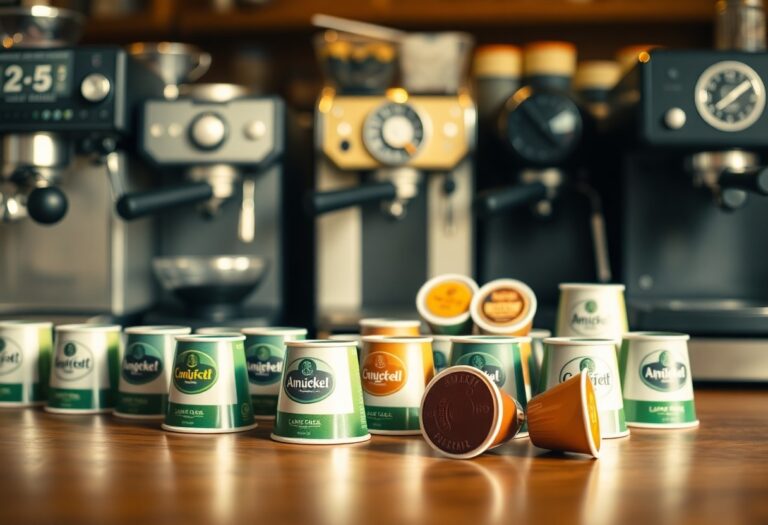What to Look for in a Coffee Machine – Buying Criteria
Just like finding the perfect coffee blend, choosing the right coffee machine can significantly enhance your brewing experience. You should consider factors like brew type, capacity, and features that suit your lifestyle and taste preferences. A machine that offers versatility will allow you to experiment with different brewing methods, while a reliable brand ensures longevity and performance. Ultimately, the right coffee machine can elevate your daily ritual, providing you with that exceptional cup of coffee every time.
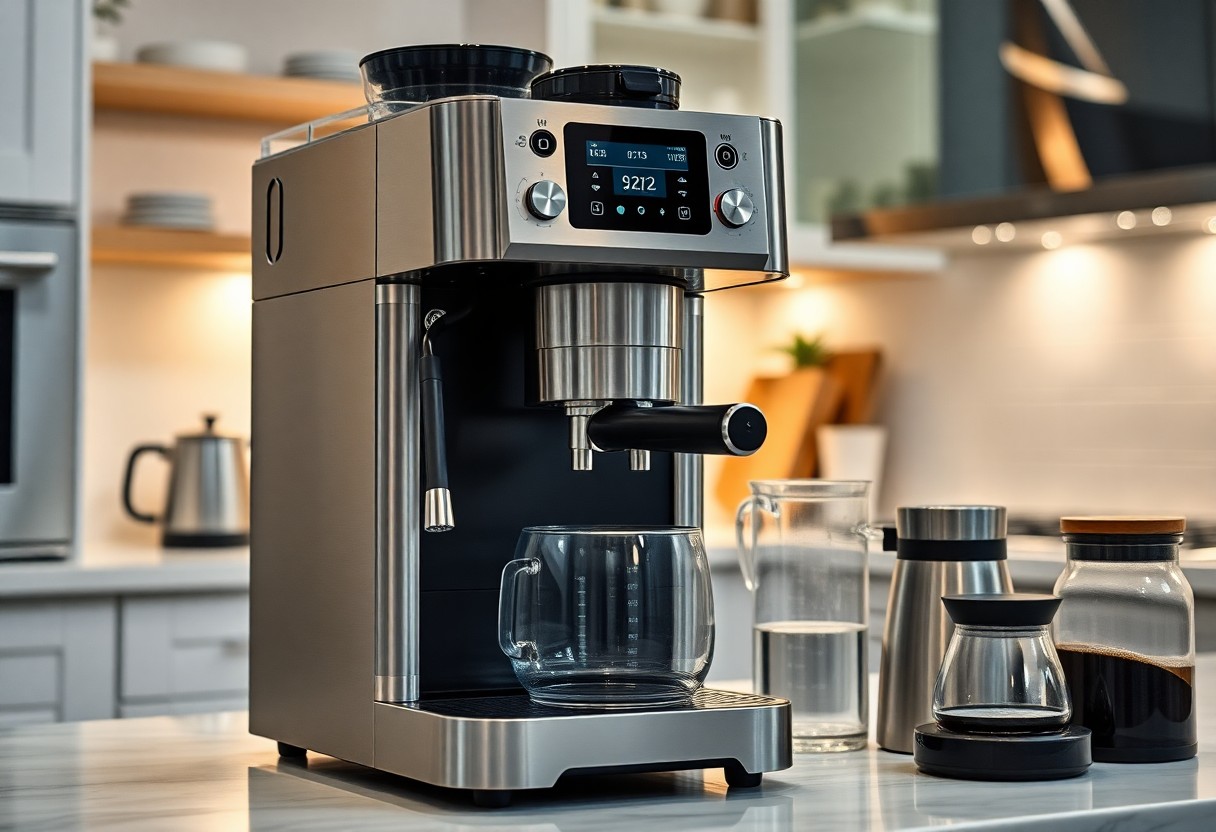
Key Takeaways:
- Consider the type of coffee machine that suits your preferences, whether it’s a drip coffee maker, espresso machine, or single-serve brewer.
- Evaluate the capacity of the machine, ensuring it meets your daily coffee consumption and the number of users in your household.
- Look for ease of use and cleaning features, like programmable settings, removable parts, and built-in grinders.
- Assess the brewing time and temperature consistency for optimal flavor extraction from your coffee grounds.
- Check for additional functionalities or features, such as frothers, water filtration systems, or smart connectivity options.
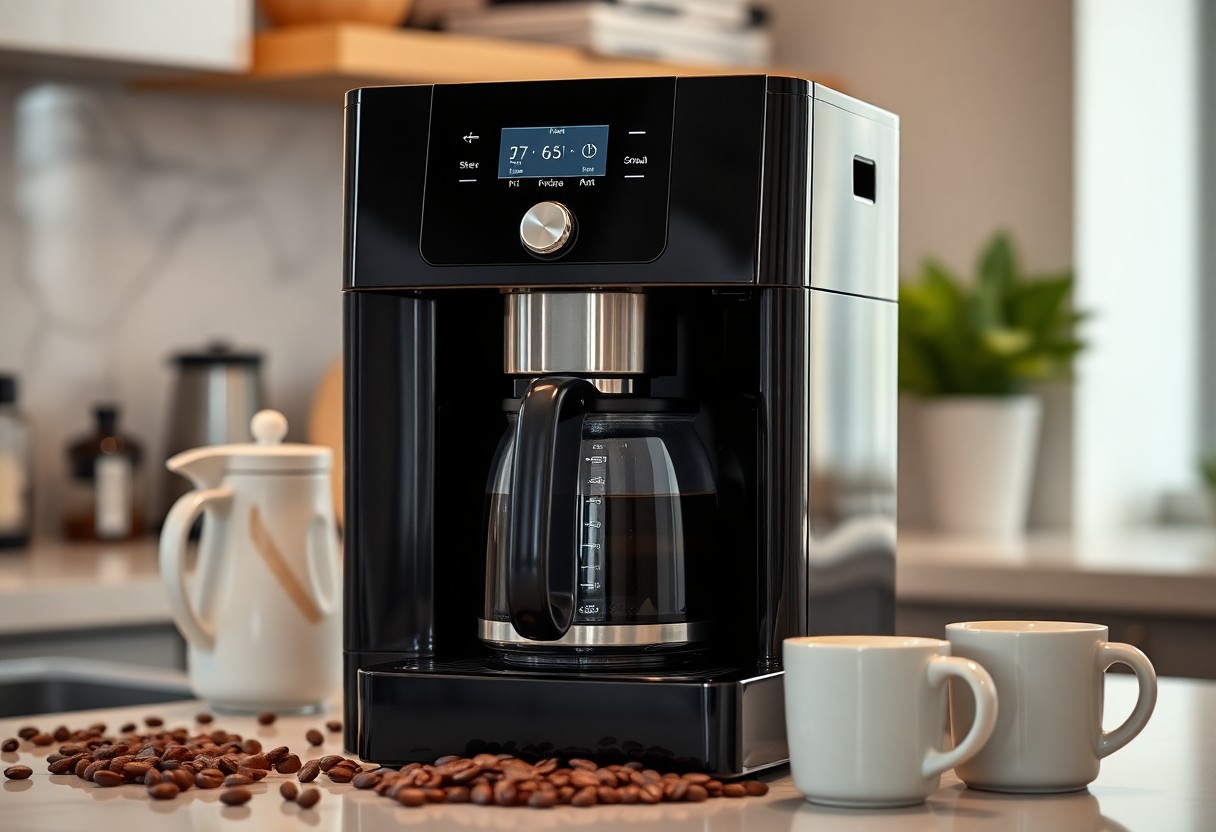
The Mechanics that Matter: Essential Features to Consider
Focusing on the mechanics of your coffee machine will enhance your brewing experience. Look for features such as programmable settings, integrated grinders, and customizable brew strengths. Smart capabilities are a bonus, allowing you to control your machine from your smartphone. To dive deeper into Buying a Coffee Maker: A Guide, you can explore more about key specifications and how they can fit your brewing style.
Brew Technology – Exploring Espresso vs. Drip vs. French Press
Your choice between espresso, drip, or French press impacts not just flavor, but also the brewing experience itself. Espresso machines force hot water through finely-ground coffee, delivering a rich, concentrated shot perfect for lattes or cappuccinos. Drip coffee makers work by circulating water through medium-grind coffee, ideal for serving larger quantities. French press relies on steeping coarsely ground coffee in hot water for a full-bodied flavor. Your brewing preference will dictate which technology serves you best.
Capacity and Size – Matching Machine Specs to Your Lifestyle
Consider how many cups you typically brew at a time. If you often have guests over or enjoy multiple cups daily, a machine with a larger capacity—such as 12-cup drip models—will save you time and effort. Compact machines fit better in tight kitchen spaces, while double-espresso makers accommodate larger households. Clarifying your coffee-making habits helps in selecting the perfect machine that aligns with your morning routine.
Capacity and size significantly influence your coffee machine choice. For instance, if you are the sole coffee drinker in your household, a smaller model with a 4-6 cup capacity may suffice, keeping your countertop uncluttered. Conversely, if your morning ritual includes family or housemates, consider larger drip coffee makers or machines with thermal carafes, which keep coffee hot for hours. Assessing your lifestyle and the frequency of coffee consumption ensures you select a machine that meets all your brewing needs efficiently.
The Influence of Cost: What Price Tells You
The price of a coffee machine can be a strong indicator of its quality and features. Generally, machines that fall into the higher price brackets offer advanced brewing technologies, enhanced materials, and longer warranties. On the other hand, budget models might lack durability and could compromise your coffee experience. Understanding this relationship between cost and quality can guide your purchasing decision, ensuring that you invest wisely in your daily brew.
Budget vs. Brilliance – How to Balance Price and Quality
Finding the sweet spot between budget and quality is vital for any coffee enthusiast. Allocating your finances thoughtfully allows you to secure a machine that meets both your brewing needs and your wallet’s limitations. For instance, seeking customer reviews and expert recommendations can provide insights into which less expensive models can still deliver stellar performance, letting you enjoy great coffee without breaking the bank.
Long-Term Investment – Evaluating the Cost of Ownership
Thinking beyond the initial purchase price reveals a more comprehensive picture of your coffee machine’s true cost. Consider maintenance, recurring expenses like filters or descaler, and the longevity of the machine itself. A higher-priced machine might deliver superior coffee and last longer, offsetting its initial expense over several years. For instance, investing in an espresso machine that requires fewer repairs can save you money long-term compared to cheaper alternatives that may need frequent servicing.
Evaluating the cost of ownership involves analyzing factors like energy consumption and the price of maintenance supplies. For example, some espresso machines are designed to be more energy-efficient, leading to reduced electricity bills, while certain models may require expensive specialty coffee pods. A calculator can help weigh these costs against the machine’s lifespan and your daily coffee consumption. If you drink multiple cups a day, a small investment might pay off significantly by boosting your coffee experience and reducing overall expenses.
User Experience: Designing for Ease and Enjoyment
A coffee machine should not only be functional but also enhance your overall experience. When choosing a coffee machine, consider how it aligns with your daily routine and personal preferences. Features that prioritize user-friendliness, such as intuitive design and accessible controls, contribute to a more enjoyable brewing experience, allowing you to savor the process as much as the final cup.
Control Interfaces – Manual vs. Automated Options
Your choice between a manual and automated control interface significantly influences your brewing experience. Manual machines often allow for greater control over variables such as brewing time and temperature, providing an opportunity for experimentation and personalization. In contrast, automated options excel in convenience, often simplifying the process with preset programs and one-touch functionality, perfect for busy mornings.
Cleaning and Maintenance – The Hidden Effort Behind Your Brew
Maintaining your coffee machine goes beyond the enjoyment of your daily brew—it’s a key factor in the machine’s longevity. Regular cleaning ensures optimal taste and prevents buildup that can affect brew quality. Many machines offer removable parts and self-cleaning features, but you should still factor in the time and effort needed to keep your coffee maker in top condition.
Investing time in cleaning and maintenance can pay off with a consistently delicious cup. Residual oils and coffee grounds can accumulate over time, leading to bitterness and unwanted flavors. For instance, a machine that requires a thorough clean every week may seem inconvenient, yet this commitment ensures your coffee’s taste remains pure and delightful. Evaluate conveniences, like dishwasher-safe components or descaling notifications, that will ease your maintenance routine. Ultimately, a well-cared-for machine enhances the longevity of your investment and your enjoyment of every sip.
Taste Fundamentals: Flavor Enhancement and Quality
Choosing the right coffee machine goes beyond mere convenience; the flavor and quality of your brew hinge on several important factors. The intricacies of taste are influenced by various attributes—including the quality of your beans, the grind size, and the temperature at which your coffee is brewed. Investing in a machine designed to enhance these elements ensures your daily cup of coffee is not only satisfying but rich in flavor nuances.
Grinder Quality – The Key to Freshness and Flavor
In your coffee journey, the significance of a high-quality grinder cannot be overstated. Freshly ground coffee beans yield a vibrant flavor profile, while stale grounds can result in a dull cup. Opt for a grinder that offers adjustable settings, allowing you to find the perfect grind size for your brewing method, ensuring every cup reflects the full richness of the coffee.
Brew Temperature and Pressure – Unlocking the Best Cup
The brew temperature and pressure play a vital role in extracting the coffee’s important oils and flavors. For optimal extraction, aim for a brew temperature between 195°F to 205°F (90°C to 96°C). Additionally, pressure during the brewing process, especially in espresso machines, should typically be around 9 bars. This combination unlocks the best cup, highlighting the deep flavors of your beans.
Key Factors in Brew Temperature and Pressure
| Factor | Details |
|---|---|
| Brew Temperature | Ideal range is 195°F to 205°F (90°C to 96°C) for full extraction. |
| Brew Pressure | Espresso machines should exert about 9 bars to create optimal crema. |
Variations in brew temperature outside the recommended range can lead to an under-extracted or over-extracted cup, affecting the acidity and bitterness. Lower temperatures may leave you with a sour taste, while higher temperatures can create an overly bitter profile. Equally, the pressure exerted during brewing plays a significant role in emulsifying coffee oils, enriching the crema and overall flavor of your espresso.
Additional Considerations for Brew Pressure
| Consideration | Impact |
|---|---|
| High Pressure | Can lead to overly bitter extraction if not controlled. |
| Low Pressure | May result in under-extracted, bland coffee with less crema. |
Brand Reputation and Support: Navigating Market Choices
Focusing on brand reputation can significantly impact your coffee machine buying experience. Established brands often come with a history of delivering quality products and services, making it easier to trust their offerings. Look for companies known for innovation, high-quality construction, and customer satisfaction to ensure a solid investment for your coffee journey. A reliable brand not only promises better performance but also provides ongoing support, which is indispensable when you encounter technical issues or need replacement parts.
Reviews and Recommendations – The Wisdom of the Crowd
Consumer reviews are invaluable when selecting a coffee machine. Genuine feedback from fellow coffee enthusiasts illuminates the strengths and weaknesses of various models. You’ll find real-life insights on performance, durability, and ease of use. Platforms like Amazon and specialty coffee forums allow you to gauge user satisfaction, helping you identify which machines consistently meet or exceed expectations.
Warranty and Customer Service – Ensuring Peace of Mind
A solid warranty demonstrates a manufacturer’s confidence in their product and serves as your safety net. Look for warranties that span at least one to two years and cover significant components. Exceptional customer service can save you from future headaches, ensuring that any issues are addressed promptly and efficiently.
Many coffee machine brands offer extended warranties or service plans for added reassurance, which can cover critical components or extensive repairs. Brands with comprehensive customer service channels provide email, chat, or phone support, ensuring you get help when you need it. The combination of a favorable warranty and responsive service team not only gives you peace of mind but also boosts your overall experience with your coffee machine, empowering you to focus on crafting the perfect cup rather than worrying about potential malfunctions.
To wrap up
Hence, as you initiate on your journey to find the perfect coffee machine, consider factors such as your brewing preferences, available space, maintenance needs, and budget. Evaluate the machine’s brewing method, capacity, and additional features to ensure it fits seamlessly into your routine. By focusing on these key aspects, you can select a coffee machine that not only meets your requirements but also enhances your coffee-drinking experience.
FAQ
Q: What are the main types of coffee machines available on the market?
A: There are several types of coffee machines to consider, including drip coffee makers, single-serve machines, espresso machines, French presses, and pour-over devices. Drip coffee makers are ideal for brewing larger quantities, while single-serve machines offer convenience and speed. Espresso machines provide a rich coffee experience for enthusiasts, while French presses and pour-over devices allow for greater control over brewing parameters.
Q: How important is the brewing capacity when selecting a coffee machine?
A: Brewing capacity is significant, as it determines how much coffee the machine can produce at once. If you frequently entertain guests or if you have a large household, opt for a machine with a higher capacity. Single-serve machines are great for individuals who drink at different times, while larger drip machines are suitable for gatherings or daily family use. Evaluate your needs and select a capacity that fits your lifestyle.
Q: What features should I consider regarding ease of use and maintenance?
A: When selecting a coffee machine, prioritize user-friendly features such as intuitive controls, programmable settings, and a straightforward cleaning process. Machines with removable parts, like water reservoirs and brew baskets, simplify cleaning and maintenance. Some models even come with self-cleaning capabilities, which can save time and effort. Ensure the machine has clearly marked indicators for water levels and ground coffee measurements for added convenience.
Q: How does the material and build quality affect the performance of a coffee machine?
A: The material and build quality impact the durability and overall performance of a coffee machine. Stainless steel machines tend to be more sturdy and resistant to wear compared to plastic models. Additionally, a well-constructed machine often features better insulation, which can maintain the coffee temperature for longer. Look for machines with high-quality components to ensure longevity and a consistently enjoyable brewing experience.
Q: What role do advanced features and technology play in coffee machine selection?
A: Advanced features and technology can enhance the coffee brewing experience significantly. Consider options like programmable timers, customizable brew strength, and connectivity to smart devices. Some machines offer built-in grinders, milk frothers, and specialized brew settings. These features can improve convenience and allow you to tailor the coffee flavor to your preference, making the investment worthwhile if you seek versatility and innovation in your coffee brewing.

